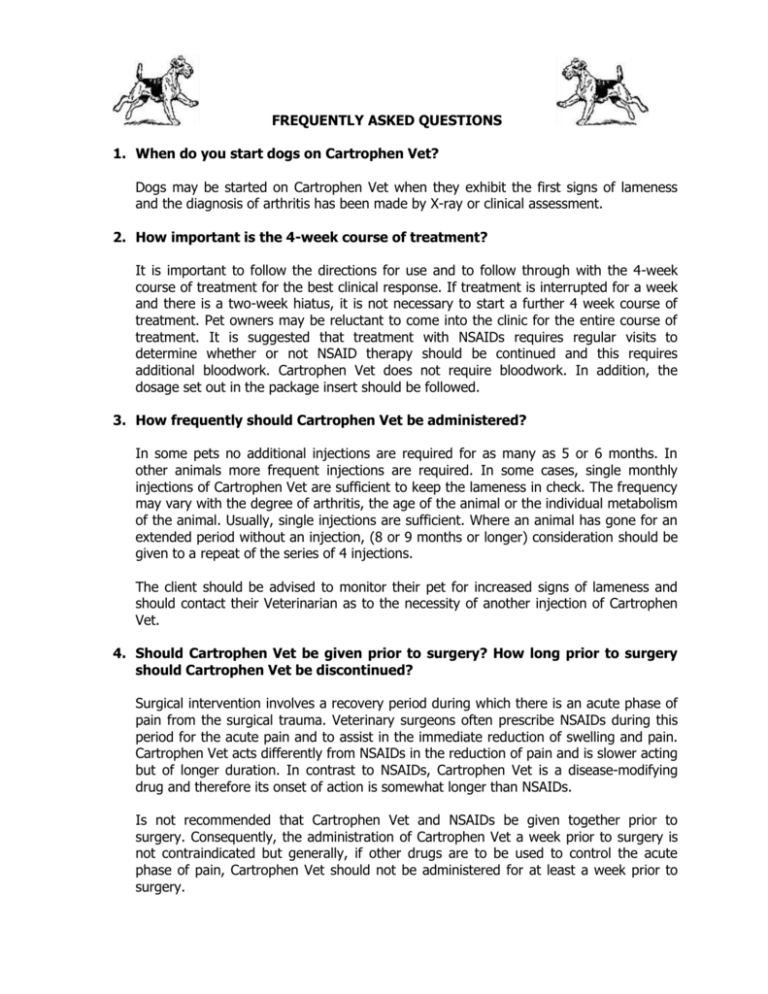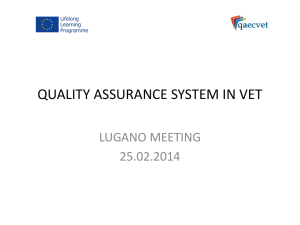Questions and Answers
advertisement

FREQUENTLY ASKED QUESTIONS 1. When do you start dogs on Cartrophen Vet? Dogs may be started on Cartrophen Vet when they exhibit the first signs of lameness and the diagnosis of arthritis has been made by X-ray or clinical assessment. 2. How important is the 4-week course of treatment? It is important to follow the directions for use and to follow through with the 4-week course of treatment for the best clinical response. If treatment is interrupted for a week and there is a two-week hiatus, it is not necessary to start a further 4 week course of treatment. Pet owners may be reluctant to come into the clinic for the entire course of treatment. It is suggested that treatment with NSAIDs requires regular visits to determine whether or not NSAID therapy should be continued and this requires additional bloodwork. Cartrophen Vet does not require bloodwork. In addition, the dosage set out in the package insert should be followed. 3. How frequently should Cartrophen Vet be administered? In some pets no additional injections are required for as many as 5 or 6 months. In other animals more frequent injections are required. In some cases, single monthly injections of Cartrophen Vet are sufficient to keep the lameness in check. The frequency may vary with the degree of arthritis, the age of the animal or the individual metabolism of the animal. Usually, single injections are sufficient. Where an animal has gone for an extended period without an injection, (8 or 9 months or longer) consideration should be given to a repeat of the series of 4 injections. The client should be advised to monitor their pet for increased signs of lameness and should contact their Veterinarian as to the necessity of another injection of Cartrophen Vet. 4. Should Cartrophen Vet be given prior to surgery? How long prior to surgery should Cartrophen Vet be discontinued? Surgical intervention involves a recovery period during which there is an acute phase of pain from the surgical trauma. Veterinary surgeons often prescribe NSAIDs during this period for the acute pain and to assist in the immediate reduction of swelling and pain. Cartrophen Vet acts differently from NSAIDs in the reduction of pain and is slower acting but of longer duration. In contrast to NSAIDs, Cartrophen Vet is a disease-modifying drug and therefore its onset of action is somewhat longer than NSAIDs. Is not recommended that Cartrophen Vet and NSAIDs be given together prior to surgery. Consequently, the administration of Cartrophen Vet a week prior to surgery is not contraindicated but generally, if other drugs are to be used to control the acute phase of pain, Cartrophen Vet should not be administered for at least a week prior to surgery. 5. Can Cartrophen Vet be administered after surgery? How long after surgery? Some Veterinary surgeons avoid the use of NSAIDs because of the delay in healing time (up to 25 %). NSAIDs are often used to take care of the acute phase of pain. Dosage instructions require the daily use of NSAIDs and they are rapidly excreted. Cartrophen Vet may be administered a few days after surgery after the NSAIDs have been discontinued, often with very beneficial results without the possibility of the adverse reactions and delay in healing time exhibited by NSAIDs. Some surgeons administer Cartrophen Vet shortly after surgery rather than use NSAIDs. There is an unintended benefit from the use of Cartrophen Vet administered after surgery when compared to NSAIDs. The pet tends to be somewhat less robust in its movements than after the use of NSAIDs. The latter may increase a false sense of confidence and the analgesic effect may result in increased physical activity when the pet should really be resting. Cartrophen Vet, being a disease-modifying drug has a slower onset of pain relief and the animal will tend to rest, as it would normally do when recovering from trauma. In human medicine it is possible to instruct the person in conservative management of lameness recovery but an animal requires some internal indicator (e.g. some pain) to instruct it to take it easy. 6. Is blood monitoring required for Cartrophen Vet as for NSAIDs? No, no blood monitoring is required. Cartrophen Vet is not an NSAID. It therefore does not have the adverse reaction profile of NSAIDs. It does not have an adverse reaction profile for which a routine blood monitoring and a close watch for adverse reactions is required. For example, gastrointestinal side effects characteristic of NSAIDs are not part of the adverse reaction profile of Cartrophen Vet. 7. Is there a benefit of the slower onset of Cartrophen Vet as compared to NSAIDs? In the discussion above concerning the administration after surgery reference was made to the benefit of rest. In the treatment of arthritis, rest and avoidance of strenuous activity is part of the treatment regimen. Cartrophen Vet's slower onset of pain relief together with its disease modifying action impose the natural tendency of the animal to rest rather than engage in strenuous exercise. NSAIDs, on the other hand by their immediate pain relief do not engage the natural inclination of the pet to take it easy. 8. How does Cartrophen Vet help in a geriatric program for pets? Cartrophen should form a significant part of a geriatric program for pets. Older pets have aging body systems which make them more vulnerable to adverse reactions from drugs with adverse reaction profiles such as those exhibited by NSAIDs. NSAIDs have to be administered daily for a long time thus potentially causing increased wear and tear on aging body systems thus increasing the chances for adverse reactions. Cartrophen Vet has remarkably few adverse reactions and yet is a very effective drug. It does not have to be administered daily. 9. What about Cartrophen Vet use in cats? ELMIRON (pentosan polysulphate sodium) is the first and only oral medication that has been approved by the FDA for treating the pain or discomfort of interstitial cystitis (IC) in man. It’s available by prescription only, and is believed to help repair and restore the damaged bladder lining. Clinical studies show some persons may experience symptom improvement in as little as 4 weeks or as long as 3 months. It has become fairly common practice to use Cartrophen Vet off label in cats for interstitial cystitis and hence we are providing the following information on its current use. Cartrophen Vet use in cats is an off label use since the product has not been approved for this indication in cats. Information as to its efficacy is anecdotal. Our experience in Canada is that there has been a steady increase in the use of Cartrophen Vet for cats. Use of Cartrophen Vet to treat arthritic conditions (e.g. cruciate problems) in cats is an off-label use. The same dosage as for dogs has been used by Veterinarians. 10. What about the use of concomitant remedies containing such products as glucosamine, chondroitin, and combinations of glucosamine and chondroitin? Clinical trials in man and animals are equivocal as to the efficacy of these products. Much controversy has focussed on studies showing some efficacy and no efficacy. No proven dosage levels have been established. Many problems have surfaced in relation to the content of the "active ingredients" in the various brands of these products. Many do not contain the labelled content of the products. None have been through the submission process for either man or animal. In some cases, these products are of such molecular structure that they are destroyed by the stomach acidity and if not, their molecular weight is such that they are not absorbed through the small intestine. Much work needs to be done with these products in relation to efficacy and dosage. The literature needs to be read with care and skepticism since much of it is published in nonpeer reviewed journals. Refer to the package insert for Cartrophen Vet prior to its administration for additional information respecting indications, dosage, efficacy and adverse reactions.








